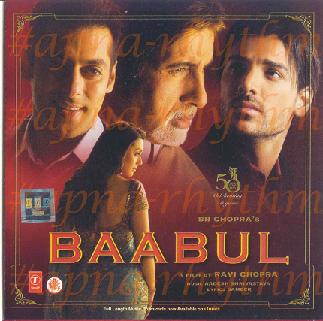
 |
 Ravi Chopra, Aadesh Srivastava, and Sameer rejoin forces along with a formidable star cast including Amithabh Bachchan, Hema Malini, Salman Khan, John Abraham, & Rani Mukerji for B.R. Chopra’s next film after their surprise hit, Baghban. The film, entitled Baabul, revisits familiar territory, namely a social/family drama. Ravi Chopra, Aadesh Srivastava, and Sameer rejoin forces along with a formidable star cast including Amithabh Bachchan, Hema Malini, Salman Khan, John Abraham, & Rani Mukerji for B.R. Chopra’s next film after their surprise hit, Baghban. The film, entitled Baabul, revisits familiar territory, namely a social/family drama.
The album begins with Come On, Come On, Baabul‚Äôs answer to Baghban‚Äôs Meri Makhana Meri Soniye. Amitabh Bachchan lends his vocals to this track and is accompanied by Sonu Nigam, Vishal, Ranjit Barot, and Aadesh Srivastava. Unfortunately, the latter three are indistinguishable and only lend support to Bachchan and Nigam. Picturized on Amitabh Bachchan and Salman Khan, the song is an attempt to fuse pop, rap, and bhangra. The song is mediocre at best ‚Äď it will undoubtedly be a pleasure to watch on screen and will be played endlessly at wedding receptions, but what makes the song slightly cringe-worthy are the unnecessary English lyrics and interjections. Though not an accomplished singer by any means, Bachchan‚Äôs vocals are perfect given the type of the song. Nigam sounds incredibly nasal in the initial parts of the song, but demonstrates why he is he among the best as the song progresses.
The next song strays from the pop genre and enters the field of romance. Sung by Sonu Nigam and Shreya Ghoshal, Keh Raha Hai is instantly appealing mainly due to its simple melody. Nigam sounds wonderful and Ghoshal provides perfect company. A mid-tempo song, it attempts some variation with occasional layered vocals, which only add to its appeal.
The pace speeds up for the next song, Har Manzar, which is likely featured on John Abraham. Sung by Kunal Ganjawala, it is one of those typical ‚Äústage‚ÄĚ songs that seems like it would be sung by a Hindi pop star. Ganjawala is his usual self and does a fine job with this song. The song is occasionally accompanied by a chorus of female singers, crooning English lyrics in the background. The song is featured twice on the album, the second time as a remix version that is actually more entertaining than the original. Baabul slows down with the next track, which is undoubtedly meant to be the theme song for the film. Kehta Hai Baabul has a very ‚Äėghazal‚Äô feel to it and is sung by Jagjit Singh. The song focuses on a father‚Äôs sadness and fear of loneliness after his daughter marries and leaves him. Its touching lyrics and classical arrangements make this song one of the more technically superior songs on the album. Its slow tempo and sad theme may prove to be a deterrent for those searching for the usual pop-bhangra variety. But those who have an immense appreciation for songs like the ones recently featured in J.P. Dutta Umrao Jaan, will definitely value this track. Singh is the perfect choice as his voice provides the necessary grief that this song exudes. Kunal Ganjawala returns for Bebasi Dard Ka Alam, a song that enables him to display his versatility. He seldom goes overboard with his vocals and actually puts forth a touching rendition of a song that conveys a man‚Äôs desire to have his love share her sorrows. The song is somewhat reminiscent of Murder‚Äôs Bheege Hoonth Tere, also sung by Ganjawala. The lyrics are surprisingly meaningful, which can often be lacking when Sameer is the one with the pen in hand.
Srivastava utilizes one more genre in the next song, namely that of a ‚Äėqawalli‚Äô. Gaa Re Mann features Sudesh Bhonsle, with support from Alka Yagnik, Kavitha Krishnamurthy, and Kailash Kher. Bhonsle has traditionally been a staple playback singer for many of Bachchan‚Äôs songs, mainly due to his resemblance to Bachchan‚Äôs voice. He does an adequate job, but it is the ladies that actually shine on this track. Krishnamurthy is a welcome change, as she seems to have disappeared from the Hindi music scene of late. It is interesting to hear Yagnik only once on this album as she usually dominates most of the albums she is featured on; however, she excels with whatever she is given and complements Krishnamurthy well. The picturization of the song should be highly anticipated as it likely to feature all of the major actors/actresses in this film. The album slows down once again, this time for a ‚Äėbidaai‚Äô song. It is sung by one of India‚Äôs most underrated singers, Richa Sharma. After ‚ÄúAgle Janam Mohe Bitiya from Umrao Jaan, this is a second feather in Sharma‚Äôs cap. She completely takes control of the song and exploits her vocal instrument to its maximum. Her rendition is poignant and is especially impressive as the song has very little instrumentation. After a couple of remixes (Har Manzar & Come On, Come On), the album closes with Vada Raha, a short, melancholic version of Keh Raha Hai sung by Sonu Nigam. Clocking in at less than 2.5 minutes, the song is mainly music with few vocals, leaving very little to be critiqued. Baabul is definitely worth the purchase for Hindi music aficionados. The album offers just about everything, from pop to bhangra, from a bidaai song to a qawalli, from romantic songs to classical pieces. It is well balanced and features a great array of vocalists, each of whom perfectly suits the genre for which they were chosen. Aadesh Srivastava is given the opportunity to shine and does so quite successfully. Even Sameer proves that not every album requires Javed Akthar or Gulzar to offer songs with eloquent lyrics.
|
| Comments | Contact Us | Advertise | Terms of Service | Privacy Policy |